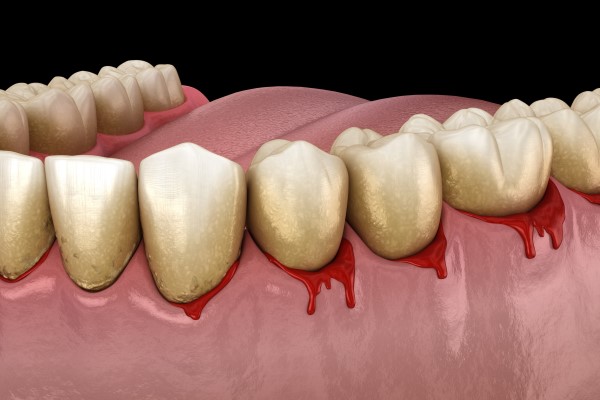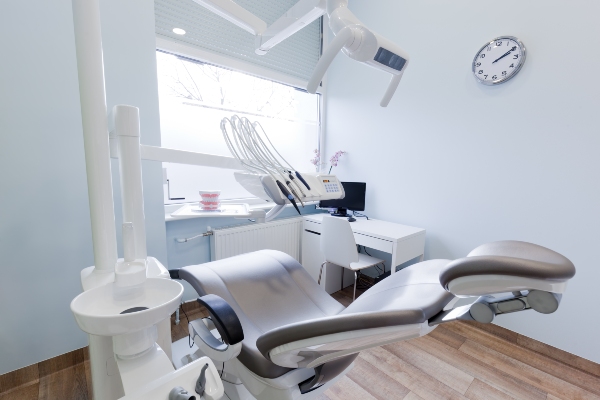How Is Gum Disease Treated by a General Dentist?

Gum disease, also commonly referred to as periodontal disease, is an inflammation of the gums. It is caused by plaque, which is a sticky, colorless film of bacteria that often forms on teeth. Gum disease usually causes tooth loss. It is often painless, so you may not even know you have it. Fortunately, gum disease can usually be treated successfully by a dentist.
Gum disease treatment
The symptoms of gum disease include gums that bleed easily, red and swollen gums, persistent bad breath, and pus between the gums and teeth. Other common symptoms are gums that have pulled away from the teeth or teeth that are moving away from one another or loose. A professional cleaning can help if gum disease is caught early. This is when it has not damaged the structures below the gumline. Scaling and root planing may be recommended if the pockets between the teeth and gums are very deep.
Professional dental cleaning
During a regular checkup, the dentist or hygienist will remove the plaque and tartar from above and below the gumline. Professional dental cleaning may be recommended more than twice a year if a patient has some signs of gum disease. But it is important to note that dental cleanings are not ideal for active gum disease. But they are a beneficial preventive measure.
Scaling and root planing
Scaling and root planing can be done at the office of the dentist as an outpatient procedure. A patient may need one or more appointments depending on the severity of the condition. The dentist may use a local anesthetic to minimize the discomfort. This deep cleaning has two important parts.
The procedure involves scaling all plaque and tartar deposits from the teeth and root surfaces. The dental provider will make sure to clean thoroughly all the way to the bottom of the pocket. Root planing will help to smoothen all the rough areas on the surfaces of the roots. This will allow the gums to heal and reattach themselves more firmly on the teeth. To help control infection and pain or aid in healing, the dentist may recommend medications. These could include a pill, mouth rinse, or a substance that will be placed directly in the pocket that was cleaned.
At the next appointment, the dentist will check how the gums have healed. The provider will also measure the depth of the pockets. If the pockets are deep and the supporting bone is lost, surgery may be recommended. It may help prevent tooth loss. In this case, a patient may be referred to a periodontist.
The stages of gum disease
Gum disease happens in three stages. The dentist can explain each so that the patient can be aware of what is happening. This can help the patient exert more effort in performing oral care. Here are the three stages of gum disease:
- Gingivitis is the earliest stage. Gum inflammation occurs because of plaque buildup along the gumline. Improper daily oral care leaves enough plaque to produce toxins that irritate the gums. Bleeding gums during flossing and brushing is a common symptom of this condition. Treatment can still reverse the symptoms at this stage.
- Periodontitis is when the jawbone and its supporting tissues already have irreversible damage. There are gum pockets forming below the gumline. These pockets trap bacteria and food particles. Treatment and proper care at home can treat this condition.
- Advanced periodontitis is the last stage of gum disease. This is when the bone and connective tissue are already destroyed. Teeth will start to loosen or shift. The patient will have difficulty eating. The dentist may need to remove the teeth if aggressive treatment does not work.
Common causes
Many people suffer from gum disease. Most of them do not know that they have it or what could have started it. Awareness of the common causes of gum disease can help one become more careful about developing this dental condition. Here are the common causes of gum disease:
- Some prescription medications have side effects like low saliva flow and production. These effects can lead to dry mouth, which triggers the buildup of bacteria.
- Plaque buildup is when a thick layer of biofilm is on the teeth. This often happens if the patient does not brush or floss properly. Failure to have dental cleanings is also a cause of plaque buildup.
- Other causes are hormonal shifts in women, nutrient deficiencies, and tobacco consumption. Genetics and crooked teeth are also culprits.
Bottom line
Scaling and root planing is an effective treatment option for gum disease. Surgery is usually deemed necessary when pockets do not heal after scaling and root planing. But you do not have to lose teeth due to periodontal diseases. You should brush your teeth twice every day and clean between your teeth daily. Eating a balanced diet, avoiding using tobacco, and seeing the dentist regularly will also help.
Request an appointment here: https://www.tanqueverdedental.com or call Oro Valley Family Dentistry at (520) 833-5261 for an appointment in our Tucson office.
Check out what others are saying about our dental services on Yelp: Gum Disease in Tucson, AZ.
Related Posts
Although there are often no painful symptoms of gum disease in the early stages, it is crucial to treat gum disease as soon as it is detected. Otherwise, the disease could worsen or lead to more severe oral health concerns that require extensive treatment to address properly.Understanding the dangers of gum disease can provide the…
Like cavities, gum disease is a common dental dysfunction that affects people of all ages. If you are suffering from gum disease, you should not put off getting treatment. Your general dentist has the knowledge and training to relieve the symptoms of this disease. In some cases, the dentist might be able to reverse its…
Looking for information on preventive dentistry? Read on to learn more. A good preventive dentist can save you money on significant tooth problems, pain, and costly treatments in the future. All treatments or procedures that prevent tooth decay, tooth damage, and gum disease fall under preventive dentistry. Fortunately, when preventive dentistry is incorporated into daily…
Fluoride treatments are very important in preventative dental care. Every patient wants their dentist to provide them with all the necessary tools to keep their smile bright and white. You go to the dentist twice a year as recommended and brush and floss your teeth regularly.Doing your part in your oral care routine only goes…


